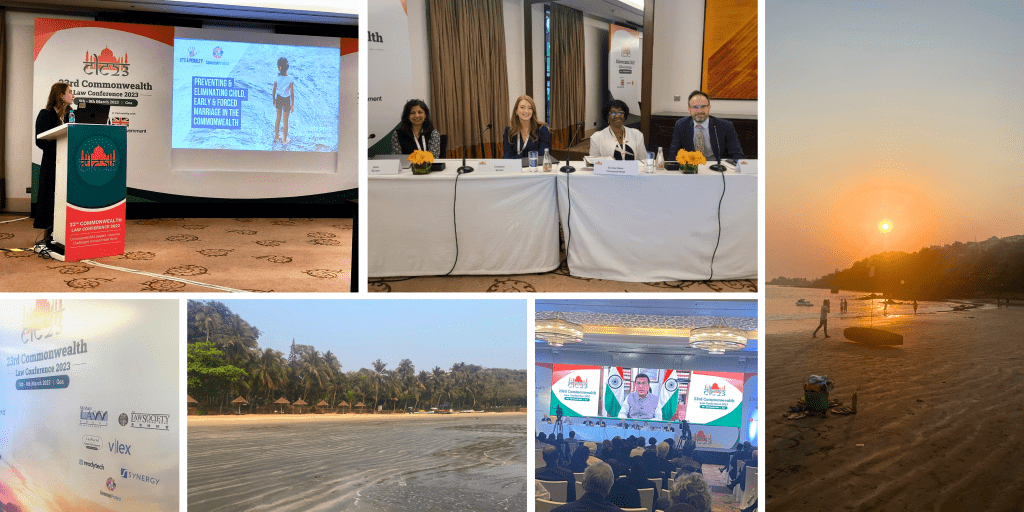Common Challenges in Uncommon Times: Commonwealth Law Conference 2023

Earlier this month, It’s a Penalty’s Advocacy Director, Elizabeth Speller, attended the Commonwealth Law Conference 2023, organised by our partners the Commonwealth Lawyers Association, in Goa, India. Under the theme of ‘Common Challenges in Uncommon Times’, lawyers and activists from across the international community gathered in Goa to discuss legal and justice issues that are faced throughout the Commonwealth and beyond. In this blog post, Elizabeth recounts her time in Goa and highlights key pan-Commonwealth issues and how they overlap with It’s a Penalty’s CommonProtect advocacy initiative.
___________________________________________________________
It was an honour to be invited by the Commonwealth Lawyers Association (CLA) to attend the 23rd Commonwealth Law Conference in Goa (5-9th March 2023). This opportunity arose in part due to It’s a Penalty’s partnership with the CLA on CommonProtect, through which we aim to create a Commonwealth where all children are protected from sexual exploitation and abuse through legal reform and systems change.
Part of CommonProtect’s ambition is to highlight child protection issues that resonate not just in one country, but across regions and the whole of the Commonwealth. Many of these issues were identified in the report we published last year entitled CommonProtect: A review of the legal systems protecting children from sexual exploitation and abuse across the Commonwealth. It is our hope that by spotlighting case studies and best practice examples in Commonwealth countries, we can find common solutions to these shared challenges. The commonality in many issues throughout the Commonwealth was made clear during the discussions and panels that I engaged with during my time in Goa, in particular due to the CLC23’s theme of ‘Common Challenges in Uncommon Times’.
Child, early & forced marriage (CEFM) and other forms of modern slavery
Following the publication of It’s a Penalty’s most recent Policy Brief in November 2022 on Preventing and Eliminating Child, Early and Forced Marriage in the Commonwealth, I was invited to speak on the conference panel discussing child marriage. The panel, entitled Child brides and legalised marital rape – a Commonwealth tragedy, was chaired by Robert Strang (3 Hare Court Chambers, England) and I was delighted to be joined on the panel by Senator Hazel Thompson Ahye (Trinidad & Tobago) and Sneh Aurora (Commonwealth Human Rights Initiative, England).
Child, early and forced marriage (CEFM) is an enormous issue throughout the Commonwealth, with an estimated 8.8 million girls being married each year in Commonwealth countries. We know that CEFM has devastating consequences for the majority of those who are subjected to it, including greater risk of sexual violence, intimate partner violence, limited social engagement and economic empowerment, and discontinued education due to school dropout. The urgency to address this problem is clear. As a result of COVID-19, it has been projected that an additional 10 million girls are at risk of marrying as children by 2030. It is clear that widespread collaboration and partnership is needed in order to affect change for millions of children across the Commonwealth, and we will continue to work towards this alongside our partners at the Commonwealth Lawyers Association and others.
As an issue that affects millions of people Commonwealth-wide, the broader topic of modern slavery also featured on the conference’s agenda. Throughout the Commonwealth, modern slavery takes many forms. Most commonly, people are exploited through forced labour, commercial sexual exploitation of children, human trafficking, the worst forms of child labour, and forced marriage. High rates of poverty and gender inequality contribute to modern slavery in many Commonwealth countries. In previous years and at this year’s Commonwealth Heads of Government Meeting (CHOGM) in Rwanda, Commonwealth states have committed to the eradication of modern slavery. However, as was identified by our friends the Commonwealth Human Rights Initiative (CHRI) and Walk Free, it is clear that there is still a way to go in putting these commitments by states into action and making concrete steps towards the eradication of modern slavery in all of its forms in the Commonwealth.
Last year at the 2022 Commonwealth Heads of Government Meeting (CHOGM) in Rwanda, we were encouraged to see Commonwealth leaders issued the Kigali Declaration on Child Care and Protection Reform – a milestone declaration that committed the Commonwealth to ensure the social protection and safeguarding of children and young people. It lays down potential actions to better protect children and young people across the Commonwealth from abuse, violence, exploitation and neglect.
Ahead of the 2023 Commonwealth Law Conference in February, It’s a Penalty worked with the Commonwealth Secretariat and other partners to organise a Commonwealth Roundtable discussion to convene key stakeholders to explore how to effectively implement the Kigali Declaration. Throughout the Roundtable the importance of the consideration of legal frameworks and international conventions, as well as child protection policy and implementation, was highlighted. The Roundtable encouraged collective action and knowledge sharing across the Commonwealth to implement a holistic and comprehensive approach to tackle violence against children. This importance of learning and sharing between Commonwealth states and stakeholders to address complex issues was particularly emphasised during my time at the Conference.
The legacy of colonialism
Almost all member countries of the Commonwealth are former colonial territories of the British Empire. As such, many discussions throughout the 2023 Commonwealth Law Conference centred around the impact, both direct and indirect, and the lasting legacy of colonialism. Not just consigned to the history books, these issues are relevant and affecting many people and communities today throughout the Commonwealth and beyond.
Particularly relevant to our work at CommonProtect, and as we identified in the CommonProtect report research, the legacy of colonialism is ever-present in laws and social attitudes that negatively impact the lives of women and girls, as well as those belonging to the LGBTQIA+ community. Furthermore, throughout many Commonwealth countries ‘inequity and ongoing colonisation’ places many children, particularly those belonging to marginalised and indigenous communities, at greater risk of sexual exploitation and abuse.
Climate change & the protection of the environment
The issue of climate change and the protection of the environment was the subject of many discussions, especially given the great risk that many Commonwealth countries face from the effects of climate change and climate-related natural disasters. Of the 56 Commonwealth member states, 32 are small and island states that are particularly vulnerable to these effects.
The climate crisis has been described by many as a child rights crisis (UNICEF, 2023). According to Save the Children, nearly 1.9 billion children – four out of five – worldwide are at high climate risk, estimated to experience at least one extreme climate event per year, including heatwaves, cyclones, flooding, water scarcity, wildfires or crop failure. With such disasters, it is the secondary impacts that have direct consequences for children – including protection systems coming under increasing strain as power imbalances become more acute, causing an increase in stress within families and a decrease in access to local protection services. Furthermore, the growing occurrence of climate-related disasters around the world has, to date, resulted in millions of people being displaced and forced to migrate. This climate-induced migration and displacement exposes many to violence and abuse, including forced marriage, forced labour and exploitation, and disrupts livelihoods, education and access to basic services.
Given the climate crisis’ impacts on children and their increased risk of experiencing abuse, exploitation, human trafficking and other forms of violence in the aftermath of climate-related disasters, this is an area that we at CommonProtect are looking to focus on in the coming months.

My time in Goa was wonderful, and made all the better by the many inspiring people that I met. The conference made it clear how important a voice the CLA and its members are for challenging issues in the Commonwealth, and we are so proud to continue working alongside them as partners.
Written by Elizabeth Speller
Advocacy Director, It’s a Penalty
